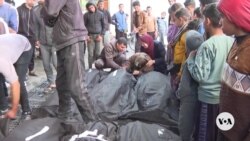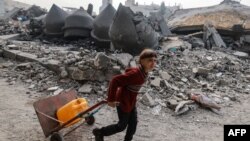Israeli Prime Minister Benjamin Netanyahu’s office said Monday the Israeli military presented “presented the War Cabinet with a plan for evacuating the population from areas of fighting in the Gaza Strip, and with the upcoming operational plan.”
The statement followed a pledge by Netanyahu to push ahead with plans for a ground invasion in the southern Gaza town of Rafah, where more than half of Gaza’s population has sought shelter from the war.
Monday’s statement did not give any details about where the Palestinians would be able to go.
Rafah is located along the border between the Gaza Strip and Egypt. Areas to the north have been devastated by four months of war, and Egypt has said it will not open its borders.
The United Nations has expressed concern about any plan to move the civilian population in Gaza and about Israeli plans to launch an offensive in the area populated by people already in need of humanitarian aid.
"What is clear is that people need to be protected, but we also do not want to see any forced displacement - forced mass displacement - of people, which is by definition against their will," U.N. spokesman Stephane Dujarric said earlier this month. "We would not support in any way forced displacement, which goes against international law."
Netanyahu told the CBS news show “Face the Nation” in an interview broadcast Sunday that once Israeli forces begin a Rafah operation, Israel would be weeks away from victory in Gaza.
Netanyahu said it was not clear whether a cease-fire and hostage deal would materialize from new talks in Qatar, saying Hamas needed to "come down to a reasonable situation."
He said if Israel has a deal for a cease-fire, a Rafah invasion “will be delayed somewhat, but it will happen. If we don't have a deal, we'll do it anyway.”
The United States has been Israel’s chief ally in the war against Hamas, but White House national security adviser Jake Sullivan told NBC’s “Meet the Press” that Netanyahu has not informed Washington of its plans for a Rafah attack and any evacuation of Palestinians.
Watch related report by Arash Arabasadi:
“We're talking about more than a million people who have been pushed into this small space in Gaza because of military operations elsewhere,” Sullivan said. “And so, we've been clear that we do not believe that an operation — a major military operation — should proceed in Rafah, unless there is a clear and executable plan to protect those civilians, to get them to safety and to feed, clothe and house them. And we have not seen a plan like that.”
Israel agreed late Saturday to send negotiators to Qatar for further talks. Hamas said it has not been involved in the latest discussions developed by the United States, Egypt and Qatar but the reported plan appears to largely match the demands it had made for the first phase of a halt in the war.
A senior Egyptian official said Saturday that the draft cease-fire deal includes the release of up to 40 women and older hostages, from among about 100 living hostages held by Hamas, in return for up to 300 Palestinian prisoners, mostly women, minors and older people, being freed by Israel.
In addition, there would be a six-week pause in the fighting that would include allowing hundreds of trucks filled with food and humanitarian aid to enter Gaza every day, including for the northern half of the besieged territory. During the temporary halt in fighting, there would be further negotiations for the release of more hostages and a permanent cease-fire.
"Representatives of Israel, the United States, Egypt, and Qatar met in Paris and came to an understanding among the four of them about what the basic contours of a hostage deal for temporary cease-fire would look like," Sullivan told CNN’s “State of the Union” show.
Israel began its military campaign to wipe out Hamas after the October 7 Hamas terror attack on Israel killed 1,200 people according to Israeli tallies and led to the capture of about 250 hostages. Israel’s counteroffensive has killed nearly 30,000 people in Gaza, according to the Hamas-run Gaza health ministry, with Israel saying it has killed 12,000 Hamas fighters. Most of those killed have been women and children.
About 100 hostages were released during a weeklong cease-fire in November. The Israeli military says it believes about 30 hostages held by Hamas have subsequently died or been killed in Gaza.
Aside from any halt in fighting or an Israeli ground invasion of Rafah, the fate of Gaza after the war remains uncertain. Netanyahu called last week for continued Israeli control of the territory along the Mediterranean Sea and remains opposed to the creation of an independent Palestinian state to rule Gaza and the Israeli-occupied West Bank.
Sullivan told Fox News the U.S. has not “moved an inch” off its support for the creation of a Palestinian state.
Some information for this report came from The Associated Press, Agence France-Presse and Reuters.









